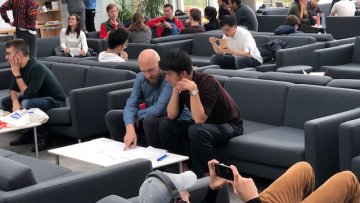Financial, socio-economic and other life circumstances can make it difficult for some to continue studying beyond an undergraduate degree. UNIQ+ is intended to encourage access to postgraduate study from talented undergraduates from across the UK who would find continuing into postgraduate study a challenge for reasons other than their academic ability.
14:00
Extremal problems of long cycles in random graphs
Abstract
In this talk, we consider the random version of some classical extremal problems in the context of long cycles. This type of problems can also be seen as random analogues of the Turán number of long cycles, established by Woodall in 1972.
For a graph $G$ on $n$ vertices and a graph $H$, denote by $\text{ex}(G,H)$ the maximal number of edges in an $H$-free subgraph of $G$. We consider a random graph $G\sim G(n,p)$ where $p>C/n$, and determine the asymptotic value of $\text{ex}(G,C_t)$, for every $A\log(n)< t< (1- \varepsilon)n$. The behaviour of $\text{ex}(G,C_t)$ can depend substantially on the parity of $t$. In particular, our results match the classical result of Woodall, and demonstrate the transference principle in the context of long cycles.
Using similar techniques, we also prove a robustness-type result, showing the likely existence of cycles of prescribed lengths in a random subgraph of a graph with a nearly optimal density (a nearly ''Woodall graph"). If time permits, we will present some connections to size-Ramsey numbers of long cycles.
Based on joint works with Michael Krivelevich and Adva Mond.
15:45
Commensurable coHopficity and hyperbolic groups
Abstract
A broad challenge in the theory of finitely generated groups is to understand their subgroups. A group is commensurably coHopfian if its finite index subgroups are distinct from its infinite index subgroups (that is to say not abstractly isomorphic). We will focus primarily on hyperbolic groups, and give the first examples of one-ended hyperbolic groups that are not commensurably coHopfian.
This is joint work with Emily Stark.
15:45
Algorithms for infinite linear groups: methods and applications
Abstract
In this talk we will survey a novel domain of computational group theory: computing with linear groups over infinite fields. We will provide an introduction to the area, and will discuss available methods and algorithms. Special consideration is given to algorithms for Zariski dense subgroups. This includes a computer realization of the strong approximation theorem, and algorithms for arithmetic groups. We illustrate applications of our methods to the solution of problems further afield by computer experimentation.
The Big Mathematical Quiz of the Year
Abstract
Fancy a fun afternoon on the final Friday afternoon of term? Then come along, either by yourself or pre-organised teams of up to four, to this week’s Fridays@2 for the first ever Big Mathematical Quiz of the Year!
Communicating Mathematics to Non-Specialists
Abstract
Have you ever had to explain mathematics to someone who isn’t a mathematician? Maybe you’ve been cornered at a family gathering by an interested relative. Maybe you’d like to explain to a potential employer what you’ve been doing for the last three years. Maybe you’ve agreed to explain vector calculus to a room of 13-year-olds. We’ve all been there. This session will cover some top tips for talking about maths in a way that makes sense to non-mathematicians, with specific examples from the outreach team.
Telling a mathematical story
Abstract
Mathematicians need to talk and write about their mathematics. This includes undergraduates and MSc students, who may be writing a dissertation or project report, preparing a presentation on a summer research project, or preparing for a job interview. We think that it can be helpful to think of this as a form of storytelling, as this can lead to more effective communication. For a story to be engaging you also need to know your audience. In this session, we'll discuss what we mean by telling a mathematical story, give you some top tips from our experience, and give you a chance to think about how you might put this into practice.
Studying Independently - "Self-explanation training"
Abstract
When your lecturers say that they expect you to study your notes between lectures, what do they really mean? There is research on how mathematicians go about reading maths effectively. We'll look at a technique (self-explanation training) that has been shown to improve students' comprehension of proofs, and in this interactive workshop we'll practise together on some examples. Please bring a pen/pencil and paper!



